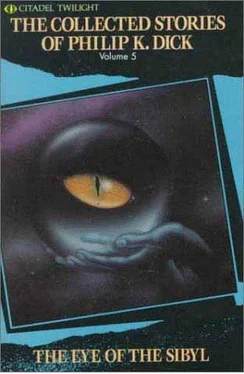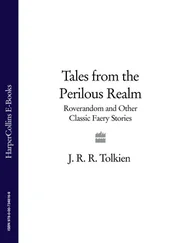Orion Stroud, Chairman of the West Marin school board, turned up the Coleman gasoline lantern so that the utility school room in the white glare became clearly lit, and all four members of the board could make out the new teacher.
“I’ll put a few questions to him,” Stroud said to the others. “First, this is Mr. Barnes and he comes from Oregon. He tells me he’s a specialist in science and natural edibles. Right, Mr. Barnes?”
The new teacher, a short, young-looking man wearing a khaki shirt and work pants, nervously cleared his throat and said, “Yes, I am familiar with chemicals and plants and animal-life, especially whatever is found out in the woods such as berries and mushrooms.”
“We’ve recently had bad luck with mushrooms,” Mrs. Tallman said, the elderly lady who had been a member of the board even in the old days before the Emergency. “It’s been our tendency to leave them alone, now.”
“I’ve looked through your pastures and woods in this area,” Mr. Barnes said, “and I’ve seen some fine examples of nutritious mushrooms; you can supplement your diet without taking any chances. I even know their Latin names.”
The board stirred and murmured. That had impressed them, Stroud realized, that about the Latin names.
“Why did you leave Oregon?” George Keller, the principal, asked bluntly.
The new teacher faced him and said, “Politics.”
“Yours or theirs?”
“Theirs,” Barnes said. “I have no politics. I teach children how to make ink and soap and how to cut the tails from lambs even if the lambs are almost grown. And I’ve got my own books.” He picked up a book from the small stack beside him, showing the board in what good shape they were. “I’ll tell you something else: you have the means here in this part of California to make paper. Did you know that?”
Mrs. Tallman said, “We knew it, Mr. Barnes, but we don’t know quite how. It has to do with bark of trees, doesn’t it?”
On the new teacher’s face appeared a mysterious expression, one of concealment. Stroud knew that Mrs. Tallman was correct, but the teacher did not want to let her know; he wanted to keep the knowledge to himself because the West Marin trustees had not yet hired him. His knowledge was not yet available—he gave nothing free. And that of course was proper; Stroud recognized that, respected Barnes for it. Only a fool gave something away for nothing.
Mrs. Tallman was scrutinizing the new teacher’s stack of books. “I see that you have Carl Jung’s Psychological Types. Is one of your sciences psychology? How nice, to acquire a teacher for our school who can tell edible mushrooms and also is an authority on Freud and Jung.”
“There’s no value in such stuff,” Stroud said, with irritation. “We need useful science, not academic hot air.” He felt personally let down; Mr. Barnes had not told him about that, about his interest in mere theory. “Psychology doesn’t dig any septic tanks.”
“I think we’re ready to vote on Mr. Barnes,” Miss Costigan, the youngest member of the board, said. “I for one am in favor of accepting him, at least on a provisional basis. Does anyone feel otherwise?”
Mrs. Tallman said to Mr. Barnes, “We killed our last teacher, you know. That’s why we need another. That’s why we sent Mr. Stroud out looking up and down the Coast until he found you.”
“We killed him because he lied to us,” Miss Costigan said. “You see, his real reason for coming here had nothing to do with teaching. He was looking for some man named Jack Tree, who it turned out lived in this area. Our Mrs. Keller, a respected member of this community and the wife of George Keller, here, our principal, is a dear friend of Mr. Tree, and she brought the news of the situation to us and of course we acted, legally and officially, through our chief of police, Mr. Earl Colvig.”
“I see,” Mr. Barnes said woodenly, listening without interrupting.
Speaking up, Orion Stroud said, “The jury which sentenced and executed him was composed of myself, Cas Stone, who’s the largest land-owner in West Marin, Mrs. Tallman and Mrs. June Raub. I say ‘executed’ but you understand that the act—when he was shot, the shooting itself—was done by Earl. That’s Earl’s job, after the West Marin Official Jury has made its decision.” He eyed the new teacher.
“It sounds,” Mr. Barnes said, “very formal and law-abiding to me. Just what I’d be interested in.” He smiled at them all, and the tension in the room relaxed; people murmured.
A cigarette—one of Andrew Gill’s special deluxe Gold Labels—was lit up; its good, rich smell wafted to them all, cheering them and making them feel more friendly to the new teacher and to one another.
Seeing the cigarette, Mr. Barnes got a strange expression on his face and he said in a husky voice, “You’ve got tobacco up here? After seven years?” He clearly could not believe it.
Smiling in amusement, Mrs. Tallman said, “We don’t have any tobacco, Mr. Barnes, because of course no one does. But we do have a tobacco expert. He fashions these special deluxe Gold Labels for us out of choice, aged vegetable and herbal materials the nature of which remains—and justly so—his individual secret.”
“How much do they cost?” Mr. Barnes asked.
“In terms of State of California boodle money,” Orion Stroud said, “about a hundred dollars apiece. In terms of pre-war silver, a nickel apiece.”
“I have a nickel,” Mr. Barnes said, reaching shakily into his coat pocket; he fished about, brought up a nickel and held it toward the smoker, who was George Keller, leaning back in his chair with his legs crossed to make himself comfortable.
“Sorry,” George said, “I don’t want to sell. You better go directly to Mr. Gill; you can find him during the day at his shop. It’s here in Point Reyes Station but of course he gets all around; he has a horse-drawn VW minibus.”
“I’ll make a note of that,” Mr. Barnes said. He put his nickel away, very carefully.
“Do you intend to board the ferry?” the Oakland official asked. “If not, I wish you’d move your car, because it’s blocking the gate.”
“Sure,” Stuart McConchie said. He got back into his car, flicked the reins that made Edward Prince of Wales, his horse, begin pulling. Edward pulled, and the engineless 1975 Pontiac passed back through the gate and out onto the pier.
The Bay, choppy and blue, lay on both sides, and Stuart watched through the windshield as a gull swooped to seize some edible from the pilings. Fishing lines, too… men catching their evening meals. Several of the men wore the remains of Army uniforms. Veterans who perhaps lived beneath the pier. Stuart drove on.
If only he could afford to telephone San Francisco. But the underwater cable was out again, and the lines had to go all the way down to San Jose and up the other side, along the peninsula, and by the time the call reached San Francisco it would cost him five dollars in silver money. So, except for a rich person, that was out of the question; he had to wait the two hours until the ferry left… but could he stand to wait that long?
He was after something important.
He had heard a rumor that a huge Soviet guided missile had been found, one which had failed to go off; it lay buried in the ground near Belmont, and a farmer had discovered it while plowing. The farmer was selling it off in the form of individual parts, of which there were thousands in the guidance system alone. The farmer wanted a penny a part, your choice. And Stuart, in his line of work, needed many such parts. But so did lots of other people. So it was first come, first serve; unless he got across the Bay to Belmont fairly soon, it would be too late.
Читать дальше









